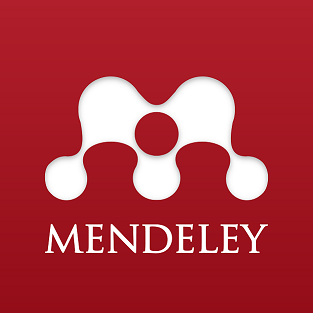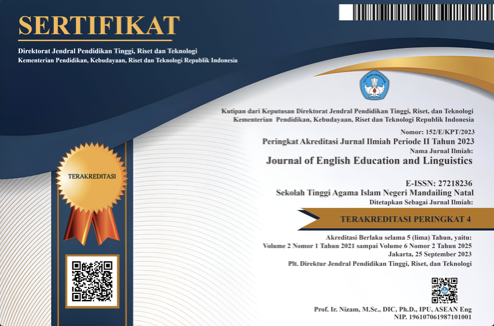THE CHALLENGES IN THE IMPLEMENTATION OF THE MERDEKA CURRICULUM IN TEACHING SPEAKING
DOI:
https://doi.org/10.56874/jeel.v5i2.1756Keywords:
teaching challenge, Merdeka curriculum, speakingAbstract
This research aims to analyze and obtain information about teachers' challenges during the implementation of the Merdeka curriculum in teaching English speaking at Muhammadiyah 1 Taman Vocational School and how teachers can overcome these problems. This research method is a qualitative descriptive method and data is obtained through observation and semi-structured interviews. The subject of this research was an 11th-grade English teacher. The results of this study found that the Merdeka Curriculum at Muhammadiyah 1 Taman Vocational School had been implemented and several challenges were found. Teachers believe that the Merdeka curriculum influences students' speaking abilities because teachers can modify teaching methods according to students' needs. Successful implementation of the Merdeka Curriculum can be achieved if teachers can overcome existing challenges. Teacher creativity in teaching, teacher motivation toward students, and institutional support enable teachers to overcome every challenge during the implementation of the Merdeka curriculum in the speaking teaching process.
References
Campbell, A., McNamara, O., & Gilroy, P. (2011). Qualitative Data Analysis. Practitioner Research and Professional Development in Education, 125–145. https://doi.org/10.4135/9780857024510.d49
Damayanti, A. D., Jannah, A. N., & Agustin, N. (2022). Implementasi Kurikulum Merdeka Dalam Pembelajaran Bahasa Indonesia Di Smp Muhammadiyah 19 Sawangan. Prosiding Samasta, 29.
JOURNAL OF ENGLISH EDUCATION AND LINGUISTICTS
Diana, E., & Rofiki, M. (2020). Analisis Metode Pembelajaran Efektif Di Era New Normal. Jurnal Review Pendidikan Dan Pengajaran, 3(2), 336–342. https://doi.org/10.31004/jrpp.v3i2.1356
Hasanah, N., & Utami, P. T. (2020). Emerging Challenges of Teaching English in Non-native English-Speaking Countries: Teachers’ View. English Language Teaching Educational Journal, 2(3), 112. https://doi.org/10.12928/eltej.v2i3.1134
Kemampuan, P., & Inggris, B. (2016). SEBAGAI DALAM MENYONGSONG ASEAN COMMUNITY 2015 Ikatan Sarjana Pendidikan Indonesia ( ISPI ) Jawa Tengah. 3, 102–106.
Khairita, M. N., Saputra, R., & Iranta, M. (2023). JOTE Volume 5 Nomor 1 Tahun 2023 Halaman 426-434 Journal On Teacher Education Research & Learning in Faculty of Education The Effect of Role Play Technique Toward Students ’ Speaking Ability in Implementation of Kurikulum Merdeka. 5, 426–434.
Kurnaedi, E. P., & Muslih, M. (2023). Implementasi Pendidikan Karakter dalam Pendidikan Inklusif. Indonesian Journal of Islamic Elementary Education, 2(2), 58–71. https://doi.org/10.28918/ijiee.v2i2.6265
Kusuma, I. P. I., & Adnyani, L. D. S. (2016). Motivasi Dan Sikap Bahasa Mahasiswa Jurusan Pendidikan Bahasa Inggris Undiksha. JPI (Jurnal Pendidikan Indonesia), 5(1), 12. https://doi.org/10.23887/jpi-undiksha.v5i1.8290
Maulinda, U. (2022). Pengembangan Modul Ajar Berbasis Kurikulum Merdeka. Tarbawi, 5(2), 130–138.
Nur Hidayah, W. (2021). Konsep Solusi Terhadap Problem Keterampilan (Skills) Berbahasa Inggris di Lembaga Pendidikan Indonesia. Jurnal Pendidikan Indonesia, 2(10), 1824–1834. https://doi.org/10.59141/japendi.v2i10.314
Rahayu, Rosita, Rahayuningsih, H. H. (2021). Jurnal basicedu. Jurnal Basicedu, 5(4), 2541–2549. https://doi.org/10.31004/basicedu.v5i4.1230
Rindayati, E., Putri, C. A. D., & Damariswara, R. (2022). Kesulitan Calon Pendidik dalam Mengembangkan Perangkat Pembelajaran pada Kurikulum Merdeka. PTK: Jurnal Tindakan Kelas, 3(1), 18–27. https://doi.org/10.53624/ptk.v3i1.104
Robert, B., & Brown, E. B. (2004). Introduction To Qualitative Research Methods - A Guide Book and Resource. J. Willey and Sons, no. 1
Sari, L., & Lestari, Z. (2019). Meningkatkan kemampuan berbicara Bahasa Inggris siswa dalam menghadapi era revolusi 4.0. Prosiding Seminar Nasional Pendidikan Program Pascasarjana Universitas PGRI Palembang , 1–11. https://jurnal.univpgri-palembang.ac.id/index.php/Prosidingpps/article/view/2566
Schedule, I., Travel, O. F., & Expenses, O. (2022). Strategies Used By The Teacher In Teaching Speaking In The Merdeka Curriculum. Journal of Economic Perspectives, 2(1), 1–4. https://doi.org/10.1080/23322039.2017
Sofyan, N. (2021). the Role of English As Global Language. Edukasi, 19(1), 21. https://doi.org/10.33387/j.edu.v19i1.3200
Suharjati, F. (2010). History of Teaching English As a Foreign Language in Indonesia. Deiksis, 2(3), 161.
Sujinem, S. (2023). Analysis Of Implementation Of Communicative Approach In Teaching English Under “Merdeka” Independent Curiculum. Jurnal REVORMA, 3(1), 56–68. https://www.whatiselt.com/single-
Thariq, P. A., Husna, A., Aulia, E., Djusfi, A. R., Lestari, R., Fahrimal, Y., & Jhoanda, R. (2021). Sosialisasi Pentingnya Menguasai Bahasa Inggris Bagi Mahasiswa. Jurnal Pengabdian Masyarakat: Darma Bakti Teuku Umar, 2(2), 316. https://doi.org/10.35308/baktiku.v2i2.2835
Downloads
Published
Issue
Section
License
All articles published in the Journal of English Education and Linguistics are licensed under a Creative Commons Attribution-ShareAlike 4.0 International (CC BY-SA) license. This means anyone is free to copy, transform, or redistribute articles for any lawful purpose in any medium, provided they give appropriate attribution to the original author(s) and Journal of English Education and Linguistics, link to the license, indicate if changes were made, and redistribute any derivative work under the same license.
Copyright on articles is retained by the respective author(s) without restrictions. A non-exclusive license is granted to the Journal of English Education and Linguistics to publish the article and identify itself as its original publisher, along with the commercial right to include the article in a hardcopy issue for sale to libraries and individuals.
Although the conditions of the Creative Commons Attribution-ShareAlike 4.0 International (CC BY-SA) license do not apply to authors (as the copyright holder of your article, you have no restrictions on your rights), by submitting to the Journal of English Education and Linguistics, authors recognize the rights of readers and must grant any third party the right to use their articles to the extent provided by the license.

This work is licensed under a Creative Commons Attribution-ShareAlike 4.0 International License.








